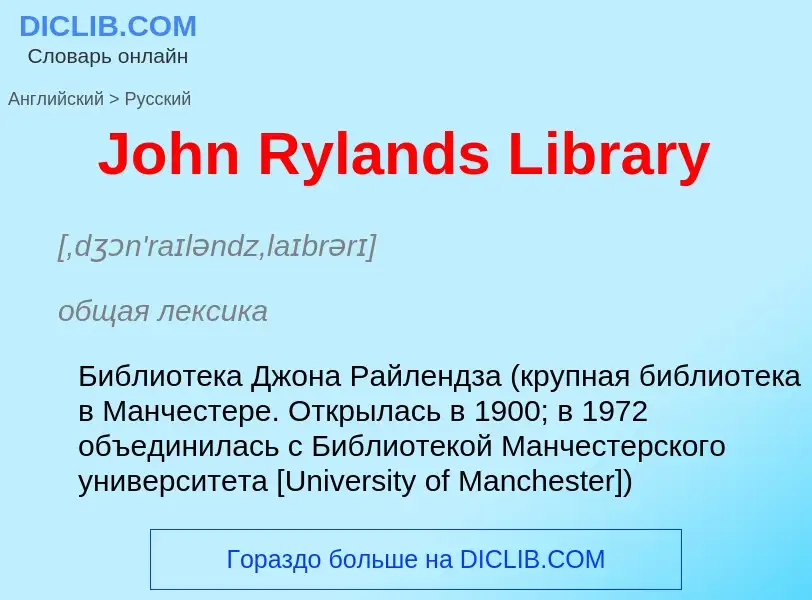Перевод и анализ слов искусственным интеллектом ChatGPT
На этой странице Вы можете получить подробный анализ слова или словосочетания, произведенный с помощью лучшей на сегодняшний день технологии искусственного интеллекта:
- как употребляется слово
- частота употребления
- используется оно чаще в устной или письменной речи
- варианты перевода слова
- примеры употребления (несколько фраз с переводом)
- этимология
John Rylands Library - перевод на Английский
[,dʒɔn'raɪləndz,laɪbrərɪ]
общая лексика
Библиотека Джона Райлендза (крупная библиотека в Манчестере. Открылась в 1900; в 1972 объединилась с Библиотекой Манчестерского университета [University of Manchester])
основана согласно завещанию Дж.Райлендза, 1801-88
синоним
[,dʒɔn'raɪləndz,ju:nɪ,və:sitɪ,laɪbrərɪ]
общая лексика
Университетская библиотека Джона Райлендза (основана в 1972 в результате объединения Библиотеки Джона Райлендза [John Rylands Library] и Библиотеки Манчестерского университета [University of Manchester])
Википедия

The John Rylands Research Institute and Library is a late-Victorian neo-Gothic building on Deansgate in Manchester, England. It is part of the University of Manchester. The library, which opened to the public in 1900, was founded by Enriqueta Augustina Rylands in memory of her husband, John Rylands. It became part of the university in 1972, and now houses the majority of the Special Collections of The University of Manchester Library, the third largest academic library in the United Kingdom.
Special collections built up by both libraries were progressively concentrated in the Deansgate building. The special collections, believed to be among the largest in the United Kingdom, include medieval illuminated manuscripts and examples of early European printing, including a Gutenberg Bible, the second largest collection of printing by William Caxton, and the most extensive collection of the editions of the Aldine Press of Venice. The Rylands Library Papyrus P52 has a claim to be the earliest extant New Testament text. The library holds personal papers and letters of notable figures, among them the novelist Elizabeth Gaskell and the scientist John Dalton.
The architectural style is primarily neo-Gothic with elements of the Arts and Crafts movement in the ornate and imposing gatehouse, facing Deansgate, which dominates the surrounding streetscape. The library, granted Grade I listed status in 1994, is maintained by the University of Manchester and open for library readers and visitors.
The library is one of the museum, library and archive collections of national and international importance under the Designation Scheme for England. As of 2020, 152 collections are officially designated.


![The [[Papyrus 52]] (fragment of the Gospel of John) at the John Rylands Library The [[Papyrus 52]] (fragment of the Gospel of John) at the John Rylands Library](https://commons.wikimedia.org/wiki/Special:FilePath/JRL19060215.jpg?width=200)







![card catalogues]] were the traditional method of organizing the list of resources and their location within a large library. card catalogues]] were the traditional method of organizing the list of resources and their location within a large library.](https://commons.wikimedia.org/wiki/Special:FilePath/2009 3962573662 card catalog.jpg?width=200)

![Interior of the [[Bibliotheca Alexandrina]], Alexandria, Egypt, showing both stacks and computer terminals Interior of the [[Bibliotheca Alexandrina]], Alexandria, Egypt, showing both stacks and computer terminals](https://commons.wikimedia.org/wiki/Special:FilePath/Alexandria, Egypt - 4416696580.jpg?width=200)
![Boston Public Library, Boston, Massachusetts, United States]] Boston Public Library, Boston, Massachusetts, United States]]](https://commons.wikimedia.org/wiki/Special:FilePath/Bates Hall - Boston Public Library.jpg?width=200)
![José Vasconcelos Library]] in Mexico City, Mexico José Vasconcelos Library]] in Mexico City, Mexico](https://commons.wikimedia.org/wiki/Special:FilePath/Biblioteca Vasconcelos, Ciudad de México, México, 2015-07-20, DD 13-15 HDR.jpg?width=200)
![Palma]], [[Balearic Islands]] Palma]], [[Balearic Islands]]](https://commons.wikimedia.org/wiki/Special:FilePath/Biblioteca de l'Ajuntament de Palma (Biblioteca de Cort).jpg?width=200)
![[[British Museum Reading Room]] [[British Museum Reading Room]]](https://commons.wikimedia.org/wiki/Special:FilePath/British Museum Reading Room Panorama Feb 2006.jpg?width=200)
![A children's library in [[Montreal]], Quebec, Canada in 1943 A children's library in [[Montreal]], Quebec, Canada in 1943](https://commons.wikimedia.org/wiki/Special:FilePath/Children. Children's Library in N.D.G BAnQ Vieux-Montréal P48S1P08742.jpg?width=200)
![A community library in [[Ethiopia]] A community library in [[Ethiopia]]](https://commons.wikimedia.org/wiki/Special:FilePath/ET Amhara asv2018-02 img120 Awra Amba.jpg?width=200)


![[[National Library of Wales]], [[Aberystwyth]] [[National Library of Wales]], [[Aberystwyth]]](https://commons.wikimedia.org/wiki/Special:FilePath/National Library of Wales.jpg?width=200)
![Main reading room of the [[Rijksmuseum Research Library]] is the largest public [[art history]] [[research library]] in the [[Netherlands]]. The library is part of the [[Rijksmuseum]] in [[Amsterdam]]. Main reading room of the [[Rijksmuseum Research Library]] is the largest public [[art history]] [[research library]] in the [[Netherlands]]. The library is part of the [[Rijksmuseum]] in [[Amsterdam]].](https://commons.wikimedia.org/wiki/Special:FilePath/Rijks Museum Library.jpg?width=200)
![The [[Robarts Library]] at the [[University of Toronto]], Canada The [[Robarts Library]] at the [[University of Toronto]], Canada](https://commons.wikimedia.org/wiki/Special:FilePath/Robartslibrary.jpg?width=200)
![The Sistine Hall of the [[Vatican Library]] The Sistine Hall of the [[Vatican Library]]](https://commons.wikimedia.org/wiki/Special:FilePath/The Sistine Hall of the Vatican Library (2994335291).jpg?width=200)
